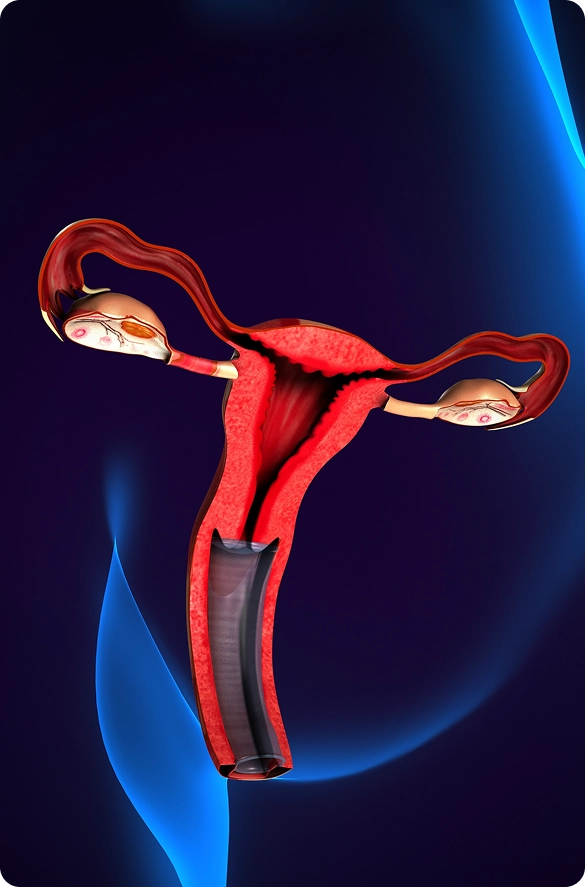
Revitalize Your Health with Personalized Care in Newport Beach
Common Symptoms Associated with Hormonal Deficiencies and Imbalances
Women struggling with age-related conditions and medical disorders caused by disruptions in the body’s normal hormone levels may begin experiencing a variety of symptoms. Hormone Replacement Therapy (HRT) can be an effective solution for replenishing estrogen, progesterone, and additional hormones that are not being produced or regulated at the levels they once were and may be the root cause behind these common symptoms:

Hot Flashes & Night Sweats

Menstrual Health Symptoms
Hormonal deficiencies or imbalances can have a negative impact on menstrual health, resulting in painful periods, heavy flow periods, and endometriosis. A lack of estrogen or progesterone can cause painful menstrual cycles and increase the risk of endometrial tissue growth.

Psychological and Emotional Symptoms
Anxiety, depression, mood swings, all of these psychological and emotional symptoms are often experienced by women who are experiencing perimenopause. Hormone replacement therapy can target the symptoms of anxiety and improve overall mood.

Sexual Dysfunction Symptoms
Frequently Asked Questions about Women’s Hormone Replacement Therapy
How safe is Hormone Replacement Therapy?
How long will it take to notice results with Hormone Replacement Therapy?
Some patients have seen marked improvements in as few as a couple of weeks after their first doses of HRT, while others may see those improvements further into the treatment regimen. Each patient is different, the time it takes to see real results may take longer or sooner than the average individual seeking treatment with HRT based on factors such as overall health, any medical issues that might be apparent, past medical history, and, of course, the specific intended goals for receiving treatment.
How is each Hormone Replacement Therapy treatment plan developed?
Dr. Garcia creates each treatment plan to target the particular challenges of every patient. There is no one-size-fits-all approach to hormone replacement therapy, the plan is customized exclusively for each patient and their medical history, symptoms, and goals. The consultation process is imperative for better understanding each patient’s concerns so they may be properly and fully addressed to ensure the most successful outcome from treatment.
Why are some treatments called bioidentical hormones?
These hormones are chemically interchangeable to those produced naturally in the body, so they are easily integrated into your system. When the body is simply unable to continue producing the proper levels of certain hormones and deficiencies begin to develop, bioidentical hormones are far more effective at reducing the deficiencies and with far fewer risks of side effects.
Who is a good candidate for Hormone Therapy treatments?
A good candidate for hormone replacement therapy is anyone who is currently struggling with symptoms of menopause such as hot flashes, night sweats, difficulty sleeping and staying asleep, bone density loss, fractured bones, atrophic vaginitis, and a significant decrease in estrogen. An initial consultation is vital for Dr. Garcia to review each patient’s symptoms and medical history and develop a customized treatment plan.
Who shouldn’t take HRT treatments?
Patients who are suffering from breast or ovarian cancer, gallbladder or liver disease, blood clots, and excessive or abnormal vaginal bleeding may not be able to take HRT treatments. A medical history of heart attack, cardiovascular disease, and stroke may also disqualify a patient from having HRT treatments administered. Women who are pregnant or planning to become pregnant are also not ideal candidates for these treatments.
What are the risks of taking HRT treatments?
HRT is safe and effective for all good candidates. These treatments do come with an elevated risk of blood clots, stroke, gallbladder diseases, and breast cancer. These risks depend on a variety of contributing factors such as the age and medical history of the patient, the length of time taking treatments, and the type of HRT treatments being administered. Dr. Garcia will review these risks as part of developing a customized treatment plan.
How long should HRT treatments last?
Every patient is different and while there is no specific time limit for administering treatment, long-term use should be carefully monitored with dosing that effectively targets the symptoms. Follow-up appointments are critical for success so the dosage levels can be adjusted when necessary and progress monitored to ensure the goals of the patient are achieved safely and successfully.
